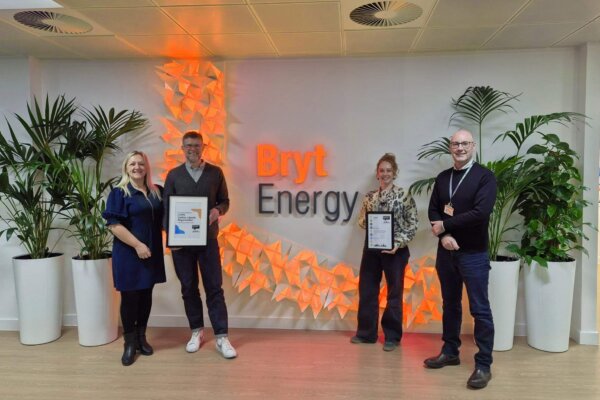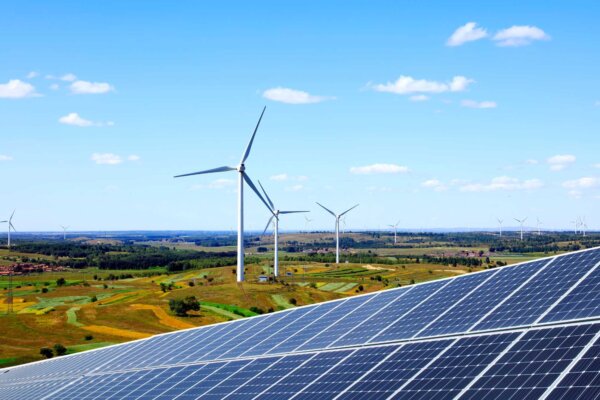We’ve now had time to digest a range of major climate and energy announcements made during the last month. This edition of Bryt Insight looks at what your business needs to know from the Intergovernmental Panel on Climate Change (IPCC)’s summary report, as well as the UK Government’s Spring Budget and Powering Up Britain policy announcements on energy security and net zero. The headlines are stark, and require swift and robust action to reduce the impacts of climate change – but there is hope, with solutions already widely available. We also look at the latest updates on the Government’s Energy Bills Discount Scheme – here’s what it all means for businesses:
The latest on the Energy Bills Discount Scheme
Call for urgent action in latest IPCC report
UK Government announces “Powering Up Britain” and Budget plans
Spotlight on Renewables
News in brief
The latest on the Energy Bills Discount Scheme
The UK Government has recently released more details around the new Energy Bills Discount Scheme (EBDS). Set to come into effect on 26th April 2023, EBDS will (retrospectively) run from 1st April 2023 – 31st March 2024, to help support businesses with the cost of wholesale energy for an additional 12 months.
The scheme also includes additional support through the ‘Energy and Trade Intensive Industries’ and ‘Qualifying Heating Suppliers’ discounts. Take a read of everything we know so far about the scheme, and what it could mean for your business, in our latest blog.
You can also find our comprehensive list of Frequently Asked Questions about EBDS on our website, here.
Call for urgent action in latest IPCC report
The Intergovernmental Panel on Climate Change (IPCC) has published its latest summary report, with scientists warning “there is a rapidly closing window of opportunity” to “secure a liveable and sustainable future for all”1. Some of the impacts of global warming are now unavoidable, with every temperature increment increase leading to more extreme climate changes. The report says the world is not yet on track to achieve the Paris Agreement’s goals of limiting warming to 1.5°C, or well below 2°C, above pre-industrial levels.
Although the warnings are stark, scientists make clear that “multiple, feasible and effective options” to reduce greenhouse gas emissions are “available now” and increasingly affordable, but rapid action across all sectors and systems is needed.
The report pulls together key findings from recent IPCC assessments and presents policymakers around the world with updated recommendations. These findings include:
- The global temperature has already increased by 1.1°C above pre-industrial levels. It is now likely to reach and exceed 1.5°C between 2030 and 2035, but it is possible for temperatures to fall below this again with immediate action to reduce greenhouse gas emissions.
- Calls for widespread adoption of innovative low-carbon technologies – such as wind turbines, solar panels, and carbon capture and storage. These solutions are not only widely available but in many cases, are also rapidly falling in cost. As well as helping individual businesses with their own energy transition, these solutions will contribute to the required large-scale investment and deployment of renewable energy.
- Calls for a “substantial” reduction in the overall use of fossil fuels, as well as a shift in how we use energy. This should include decreasing our energy demand as well as optimising what we do use to become more efficient. The report also emphasises the need for greater integration across the energy system, which would see players across the industry working more closely together on the planning and operation of the system as a whole.
- More ambitious pledges and swifter action to cut greenhouse gas emissions, with UN Secretary General, António Guterres, calling on all countries to bring their net zero plans forward by a decade.
Although the findings and recommendations are largely aimed at Governments, action involves everyone, from businesses to individuals.
“At Bryt Energy, we echo the sentiments of the report – that it is not too late to act. The report makes clear that a massive increase in renewable energy investment is critical to tackling the climate crisis. What’s more, the solutions and low carbon technologies needed to reduce emissions are already available and becoming increasingly affordable for businesses who want to accelerate their net zero journey, now.” – Ian Brothwell, Managing Director at Bryt Energy.
Our parent company, Statkraft, also reacted to the report, saying: “The report gives a bleak picture of the consequences from climate change and the state of global climate action, but it also gives room for hope as we have the technologies and the know-how needed for rapid reduction in global greenhouse gas emissions.” – Barbara Flesche, Executive Vice President for Europe, Statkraft.
Meanwhile, in the UK, the Climate Change Committee (CCC) has published its Delivering a reliable decarbonised power system report, outlining the steps needed to support the energy industry’s journey to net zero2. Like the IPCC summary report, the CCC makes its own clear warning that the UK is not currently on track to meet its climate commitments. It does, however, say the UK can build a resilient decarbonised energy system by 2035 if policymakers act now to accelerate the delivery and deployment of renewable generation and infrastructure. Launching the report, Committee Chair Lord Deben said the offer of cheap, decarbonised electricity was now within reach for every business and that renewables were “cost effective, reliable and secure”.
Both the IPCC and the CCC reports detail that – despite the need for rapid Government-level intervention – tools and technologies are available now to enable businesses to play their part in the energy transition.
For full details, you can read the IPCC report here and the CCC report here.
UK Government announces “Powering Up Britain” and Budget plans
A wide range of new and updated plans to increase energy security, lower energy costs and reach net zero emissions have been announced by the UK’s Department for Energy Security and Net Zero3. The “Powering Up Britain” policy paper includes both net zero growth and energy security plans. Here are some of the key takeaways:
- The Government intends to increase its solar power capacity fivefold to 70GW by 2035. The Government will set up a taskforce to deliver this ambition, accepting the recommendations from the net zero review published earlier this year by Chris Skidmore, covered in February’s Insight.
- A review of the planning process will take place to encourage more onshore wind farms and speed up the building of offshore wind and solar infrastructure. Meanwhile, the Floating Offshore Wind Manufacturing Investment Scheme (FLOWMIS) has also been announced. This will provide £160 million to kick start investment in port infrastructure projects needed to deliver the floating offshore wind ambitions.
- Support for businesses to invest and accelerate the transition to electric vehicles – with the specific details of this help to follow. Meanwhile, local authorities will receive £380 million funding to boost EV charging points and infrastructure across the country.
- A £30 million Heat Pump Investment Accelerator will help leverage up to £270 million of private investment to boost UK manufacturing and support the commitment to install more than 600,000 heat pumps per year by 2028. Additionally, financial support will be extended to 2028 to facilitate the continued growth of low carbon heat networks, including £220 million for the Heat Network Transformation Programme.
- Confirmation of £240 million funding for the first winners of the Net Zero Hydrogen Fund. This aims to support the commercial deployment of new low carbon hydrogen production projects this decade. Our parent company, Statkraft, is one of the companies to have been awarded funding, which will go towards its Trecwn Green Energy Hub, that will produce green hydrogen in Pembrokeshire, Wales4.
Meanwhile, in his first Spring Budget, Chancellor Jeremy Hunt made some important announcements for energy and renewables that will be of interest to businesses5, including:
- The Extension of the Climate Change Agreement (CCA) scheme for two years. This means businesses who qualify for the scheme will continue to be eligible for a discount on the Climate Change Levy, a tax added to energy bills, if they meet agreed efficiency or emission reduction targets.
- The announcement of capital allowances. One is a “full expensing” allowance, enabling businesses to deduct 100% of the costs on qualifying plant and machinery from their profits before paying tax. This is to encourage investment in new, generally more energy and water-efficient technology and equipment. This includes computers, vans, lorries and tractors, warehouse and construction equipment, and tools. Another is a 50% “first-year allowance” has also been announced for special rate and long-life assets – equipment with an expected business life of 25+ years.
- A £20 billion support package for the development of carbon capture and storage (CCS) technologies.
Spotlight on Renewables
In other news, a proposed 1.5GW pumped hydro storage facility in Scotland has received a £100 million boost6. Coire Glas, on the shores of Loch Lochy, would more than double Britain’s existing electricity storage capacity. The project received planning permission from the Scottish Government three years ago but is expected to require a £1.6 billion capital investment to construct and would require final approval. The latest investment is seen as a significant milestone on the journey to delivering the project.
Following on from last month’s Bryt Insight, there has been more progress on sustainable wind turbine blades – which have previously been difficult to recycle or reuse. The UK offshore wind project, which is being built off the North East coast, will deploy recyclable blades on nearly half of its turbines to begin with7. The agreement with manufacturer Siemens Gamesa will see 132 individual recyclable blades installed at the 1.4GW wind farm.
News in brief
- Responses to the UK Government’s Review of Electricity Market Arrangement (REMA) consultation show 80% of businesses from across the energy industry feel the current energy market is not fit for purpose8. The Government will now move on to a second consultation later this year to investigate options for reforming market arrangements in the UK. These include how to support the “significant investment” needed in new low carbon electricity generation, as well as how to deliver flexibility technologies.
- After 10 years of negotiations, the United Nations has reached an agreement to protect 30% of the world’s high seas by 20309. Before the “High Seas Treaty” was agreed in New York, just 1% of international waters were protected, leaving marine species at risk. The treaty will therefore safeguard biodiversity and also help achieve the global goal of protecting 30% of the world’s oceans by 2030 – a goal agreed at the COP15 biodiversity conference.
- A new campaign has been launched by the Government to help UK businesses become more energy efficient and reduce costs10. Aimed at small and medium-sized businesses in particular, the campaign will offer guidance on simple measures organisations can put into place that could make significant savings in both energy usage and costs. You can access the energy efficiency advice here.
TALK TO OUR TEAM
If you have any questions on how any of the updates might affect your business, our team of experts is on hand to answer them. You can get in touch with us on 0330 053 8620 or at heretohelp@brytenergy.co.uk.
Sources
1: https://www.ipcc.ch/report/sixth-assessment-report-cycle/
2: https://www.theccc.org.uk/publication/delivering-a-reliable-decarbonised-power-system/
5: https://www.gov.uk/government/publications/spring-budget-2023/spring-budget-2023-html
6: https://www.bbc.co.uk/news/uk-scotland-highlands-islands-65015217
8: https://www.gov.uk/government/consultations/review-of-electricity-market-arrangements


